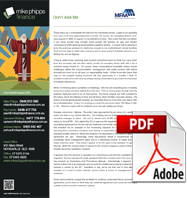These days, as I contemplate the ride into the retirement sunset, I seem to be spending more and more time dispensing wise counsel. Of course, the managing director and I have agreed to differ in respect of my definition of wise. She posits that like Joe Biden, if you hang around long enough some people will assume an age and wisdom convergence while ignoring demonstrable cognitive decline. I counter that a capacity to write the previous sentence is testimony enough to my undiminished mental faculties. Took me two days to finish that sentence and at some point it included reference to a fishing trip, but we digress.
Thing is, while those receiving said counsel sometimes seem to think I've come down from the mountain with the third tablet, mostly it's sounding board stuff with a bit of common sense thrown in. Of course, these conversations invariably centre around challenges within the accommodation management and strata sectors with advice provided pro bono on an all care, no responsibility basis. Unlike those who leave their crap on the footpath hoping someone will see opportunity in a freebie, I think it's possible to add some real value by simply having conversations grounded in a few years of industry experience.
When I'm thinking about a problem or challenge, I like the old consulting ploy of stealing someone's watch and then asking them the time. That is, most people already have the answers, they just need to go on the journey. You know, unpack the truth, prepare for the future, act in the fullness of time and all those other horrible corporate cliches. The trick is to avoid giving people answers as invariably there is more than one way to skin the proverbial feline. In fact, I'm working on a book for pet lovers titled '100 Ways to Skin a Cat'. Advance copies will be available soon through quality pet shops.
Anyway, once more I digress. Recently I was approached by an owner of a residential strata unit with a very topical dilemma. The building had no letting pool with a resident caretaker manager in place. His unit is valued circa $1.8M and the body corporate salary is circa $70K. He's asked the BC to approve the separation of the unit from the caretaking agreement so he can sell the business and remain residing in his unit. I use this situation as an example of the increasing requests for conversations we are receiving from committee members and owners in residential strata schemes. These requests usually centre on either the situation I've described or the merits of approving agreement top ups. Alarmingly, many discussions reveal a fundamental lack of knowledge about management rights and in a disturbing number of cases even how strata schemes work. That doesn't appear to be the case in the example I'm going to discuss, albeit the varying views of owners in the scheme suggest a need to think more broadly about the caretaker's request.
It appears that the scheme in question is a harmonious one and the caretaker is well regarded. He has maintained a high standard within the complex and of his own volition has created an Operations and Procedures Manual. Interestingly it appears some owners believe he is an employee and as such the intellectual property contained in the manual is owned by the BC. Needless to say, we've put that one to bed albeit an example of a need to better educate owners when it comes to management rights contracts.
Some owners wish to compel the caretaker to continue, some want him to surrender the agreement, some seem to think they can resell the agreement and some are looking at outside month-to-month contractor options.

On the information to hand I think the BC should approve the severance of the unit from the agreement and allow the current caretaker to remain as a resident while selling his business. Here's why:
- I am told the caretaker is held in high regard and is an asset to the strata community in the building. Sounds like the sort of person one might be predisposed to helping.
- I am told the caretaker is well qualified in maintenance and systems and has agreed to assist a new external caretaker.
- In selling the caretaking business someone needs to pay for it. In my experience paying for the business will create a level of focus and commitment that is highly unlikely to be achieved via a month-to-month contractor who is granted the gig for free.
- In the current market the only likely buyer for a $1.8M unit with a $70K income is someone who wants to live in the building, not someone who wants to offer caretaking services. The chances are that the outcome will be a fall in standards and disharmony in the scheme.
- The target buyer is likely close at hand. The property is in a popular tourist location with other quality high rise schemes in close proximity. One might expect that a resident management rights operator nearby would already have the scale and capacity to offer caretaking services to a neighbour and add a relatively inexpensive cash flow to an existing business.
My views on this dilemma should not be taken as a broader support for business only management rights. The traditional model of a manager residing on site as part of the strata community has stood the test of time, is highly regarded by lenders and has underpinned the value of the industry. But, I don't think we can hide from the fact that rising unit values combined with increased operating costs and higher interest rates have made some management rights virtually impossible to sell. In this situation body corporates need to decide what's best for the scheme. A stressed-out resident manager trapped in a business they no longer want, or a non-resident manager who's paid good money for a business and is focused on succeeding. By succeeding I mean doing an outstanding job, impressing the BC and never getting breached.
In closing I sometimes get the vibe that owners don't support unit severance because it may result in some financial benefit to the manager. This always seems an odd way to assess the situation as it reflects a desire to somehow punish the manager rather than do the best thing for the scheme. I guess in a perfect world we'd all like to have a manager living on site. Owners just need to be pragmatic and look at the whole picture.
Disclaimer: I refer to the catch all word 'strata' throughout this article. That's because we all know what I'm talking about.
A thought: How do we as an industry work to better educate owners and committees in strata schemes?
Mike Phipps F Fin
Director | Phippsfin Pty Ltd







